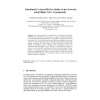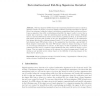686 search results - page 81 / 138 » Secure Two-Party Computation Is Practical |
129
click to vote
CCS
2007
ACM
15 years 9 months ago
2007
ACM
Despite the recent advances in the theory underlying obfuscation, there still is a need to evaluate the quality of practical obfuscating transformations more quickly and easily. T...
124
Voted
ICALP
2005
Springer
15 years 8 months ago
2005
Springer
We present a single-database private information retrieval (PIR) scheme with communication complexity O(k+d), where k ≥ log n is a security parameter that depends on the database...
137
click to vote
EUROPKI
2004
Springer
15 years 8 months ago
2004
Springer
The implementation of a standard PKI in a mobile ad hoc network (MANET) is not practical for several reasons: (1) lack of a fixed infrastructure; (2) a centralized certification au...
119
click to vote
ICICS
2004
Springer
15 years 8 months ago
2004
Springer
Fail-stop signature (FSS) schemes are important primitives because in a fail-stop signature scheme the signer is protected against unlimited powerful adversaries as follows: Even i...
119
click to vote
KDD
2004
ACM
16 years 3 months ago
2004
ACM
Secure multiparty computation allows parties to jointly compute a function of their private inputs without revealing anything but the output. Theoretical results [2] provide a gen...


